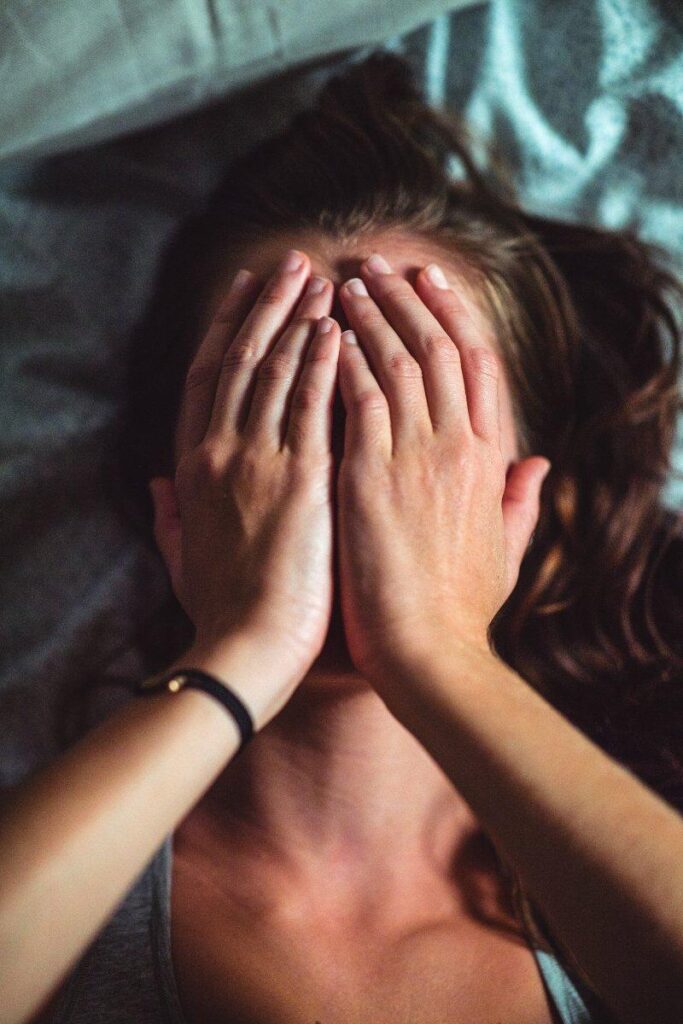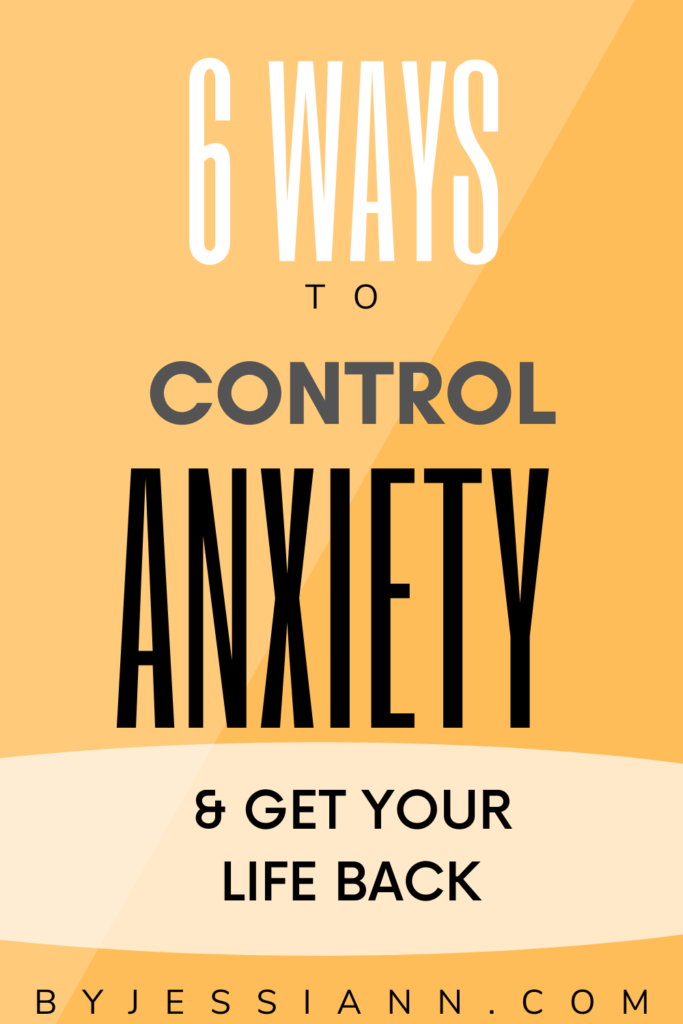This post may contain affiliate links, which means I'll receive a commission if you purchase through my link, at no extra cost to you. Please read full disclosure here.
This post is all about how I cured my anxiety.
I had my first panic attack at the age of 20.
Up until then, I was always an “anxious” person. I would get overly nervous about standing up in class in front of people or in social situations. But, I had several friends who were the same way, so I really didn’t think anything of it.
When I got to college, I started regularly going to get an iced coffee before class. I will never forget my very first anxiety attack, because it came about right after I had a large double-shot iced coffee.
I remember walking into my math class, sitting down, and immediately feeling like my heart was beating out of my chest.
It was to the point I could no longer sit down. I had to physically get up and pace around outside of the classroom. At that point I started to feel like I wasn’t taking in any oxygen (I know now I was hyperventilating).
There was no way I could go back in that classroom so I ended up leaving and driving straight home. I called one of my parents and had them stay on the phone with me the whole drive home, because I was convinced I was dying.

That one incident triggered me so much so that I spiraled into a several month long episode of crippling anxiety.
Almost immediately following this incident, I started feeling like my arms were going numb daily and I ended up having a ton of diagnostics tests ran to rule out an actual physical illness. But all my results came back completely normal.
I remember feeling so scared after weeks of hardly sleeping and completely losing my appetite. I started to forget what normal even felt like.
It took a lot of medication trial and error but I finally stabilized after being put on an antidepressant (Lexapro) and a strong sleep medication (Ambien- which I weaned off of after a few months).
Needless to say, this whole period of my life was extremely traumatic for me.
At one point I went an entire week without eating or sleeping and I lost over 10 pounds.
Nonetheless, I eventually cured my crippling anxiety and along the way I learned so much about myself. Like how strong I really am.
Fast forward almost 10 years. I like to say I cured my anxiety, but really – I just acquired a toolbox filled with weapons to keep anxiety under control.
I’ve had a handful of anxious periods in my life since, but I no longer panic. I find peace in knowing I am now equipped with the knowledge and skills to pull through.
1. Medication Management for Anxiety

Once anxiety becomes debilitating and out of control, I believe that medication is key. Hear me out on this.
When I was at my worst, I truly think the only thing that kept me from being admitted into a hospital was that I found the right medication and it kicked in.
A person can only go without eating and sleeping for so long before their body starts to break down.
If you are in an acute stage of anxiety, your body is releasing stress hormones constantly and it makes it nearly impossible to get back to normal without some medical intervention.
Less than a week after starting to take my SSRI (Selective Serotonin Reuptake Inhibitor), I started to get an appetite back and I noticed a huge decrease in my obsessive, repetitive thoughts.
Since my case was so severe, I did also have to take Ambien in order to sleep. But once my SSRI reached a therapeutic dose I was able to wean off of that and my normal sleep cycle returned.
Alternatively, if you are trying to go the natural route, you could try to control anxiety with supplements.
I personally didn’t have much luck with them. However, I think that was due to the severity of mine. My therapist at one point suggested Ashwagandha as well as GABA. Everyone is different so it’s worth a try!
2. How I Cured My Anxiety with Therapy
Until I really went through it, I always thought the only people who need to see a therapist were “crazy” people or people who didn’t have a support system to talk to. I couldn’t envision myself being the type of person who would ever need to go to therapy, because, after all, I had friends and family.
When I experienced my first major wave of anxiety, I realized that isn’t the case.
While family and friends were great, they weren’t professionals. Some things I was going through and feeling, they just couldn’t relate to and that ended up making me feel even more crazy.
Sometimes you just need professional help, and that’s perfectly okay. Furthermore, seeing a therapist will teach you so many useful coping tools and skills.
So much so that even after I got my anxiety under control the first time, I still resorted back to therapy every time another wave hit (I like to describe periods of intense anxiety as waves, because for me, it comes and goes and differs in ways it manifests itself).
A key aspect for why therapy is helpful is that it can also serve as a reminder that you are not alone in this. In fact, there has been a huge spike in the number of younger people, specifically millennials, seeking therapy.
Anxiety certainly has a way of making you feel like you are weird or crazy (what even is crazy anyways?), and that is the furthest thing from the truth. In fact, it’s more common to have some degree of anxiety in today’s age than to have none at all.
Types of Therapy:
CBT
Cognitive behavioral therapy is helpful for facing and examining your fears or anxious thoughts head on.
Relaxation Exercises
Therapy can also teach you how to practice relaxation exercises, grounding techniques, breathing exercises, as well as mantras and meditations. For instance, just by simply manipulating your breathing patterns, you can literally calm your body and mind by putting your body into a parasympathetic state. It’s something you actually have control of when you’re feeling so out of control from anxiety.
EMDR
Eye Movement Desensitization and Reprocessing involves moving your eyes in a certain way while you process traumatic memories to help you heal from trauma. It is a science-backed mental health treatment technique that has worked for many.
ERP
Exposure and Response Prevention is a type of therapy that is especially helpful for those who struggle with anxiety linked to obsessive compulsive thoughts.
3. Look at What Your Anxiety Is Trying to Tell You
Anxiety can be your body’s way of telling you something in your life needs to change.
At the end of the day, your body knows what it needs and if you continue to make unhealthy decisions or life choices, it will eventually catch up with you in one way or another.
Some changes you might consider making are to
- leave a job that is constantly stressing you out
- change your school major
- leave a toxic relationship
- end a toxic friendship
- learn to say no
- work through unresolved trauma
Basically, make life easier on yourself and remove or tweak anything that is causing you emotional distress.
4. How I Cured My Anxiety with Lifestyle Changes

I highly recommend making positive changes to your overall lifestyle as well. This could mean starting an exercise regimen or making healthier food choices.
Exercise & Anxiety
Exercising releases feel-good endorphins and can counteract anxious thoughts. Your workouts don’t have to be anything super intense. Something as simple as going for a short walk outside everyday can work wonders for your mental health.
Diet & Anxiety
As for diet, try adding in lots of fruits and veggies and increase your water intake as well. If you are a coffee drinker, try to limit yourself to 1 cup a day or just overall cut down on caffeine consumption since caffeine is known to bring on anxiety.
Cleanliness & Anxiety
I’ve also found keeping a clean and orderly home environment significantly helps my anxiety. When my house is a mess, my mental health suffers too.
I started dabbling in minimalism and it has definitely had a positive impact on my state of mind.
Sleep & Anxiety
Lastly, make sure you are getting enough sleep because this is when your body restores and renews itself.
If you struggle with actually getting to sleep the way I did, it’s okay to use medications temporarily to help you get back to normal. Your therapist can also work with you on relaxation techniques to help you fall asleep easier.
5. The Art of Distraction to Cure Anxiety
Find something that will keep your mind off of anxious thoughts and help you to stay busy. Be sure to make it a healthy distraction.
That could take on the form of:
- caring for a pet
- finding a hobby
- getting lost in a good book
- researching a topic you are passionate about
- working toward a personal goal
- focus on your job or schooling
Basically, something that forces you to think about something other than your anxiety. This way your mind will get some relief from the constant repeated track of anxious thoughts.
6. How I Cured My Anxiety With Education
So much of time spent having an anxious mind is time spent trying to run from anxious thoughts.
Try taking back your power by facing it head on and desensitizing yourself to whatever irrational, terrible thoughts you may be having.
Running from something gives it control. Confronting something takes away its power. The best way to do this is by educating yourself.
One of the ways my therapist helped me confront my anxiety was by recommending books.
One of my favorites is Healing Anxiety & Depression by Daniel Amen. This book was particularly helpful mostly because it was comforting to see that anxiety IS in fact a physical condition and a brain scan will actually show it.
It contains quizzes and helps you determine exactly which type of anxiety you suffer from. It then gives suggestions for the best treatment options including medications and natural supplements.
Final Thoughts on How I Cured My Anxiety
Don’t get me wrong, I still have my days when anxiety gets me down. I say I cured my anxiety, but really I am just a long way from where I started and that’s a win for me!
If you are struggling with anxiety and take one thing away from this, please know you are not alone.
Don’t try to hide it and pretend like everything is fine; reach out for help.
The analogy I like to think of is: you wouldn’t tell someone with diabetes that they don’t need insulin would you? Despite what some may say, anxiety is also a real impairment and it shouldn’t be sloughed off as a mindset. Chemical imbalances in the brain are real and have very REAL affects on you.
Hopefully this was helpful and offers some optimistic insight to you or someone you know who is trying to learn how to control anxiety.
If you believe you have cured your anxiety how did you do it? Do you think an anxiety disorder is something that is can be cured?
Let me know in the comments below!

You might also like:
- How to Wean off SSRI & Avoid a Nasty Withdrawal
- How to Have Better Mental Health – 19 Things to Do Weekly
Disclaimer: This article is for informational purposes and describes my experience with anxiety disorders. If you are under the care of a doctor for anxiety, please speak with them before you make any changes to your medication or current therapies.
Oh my goodness, that’s crazy! About your panic attack and your bf cheating! 🙁 Growing up I always felt anxious but it wasn’t until I was older that I realized it was anxiety. I always just thought I was kind of crazy. I also hated and still hate presenting in front of people- thankfully college is over for me. But sometimes at work when I have to talk during training even on like Zoom (not often) I feel so anxious!
Oh wow..It sounds like you have a minor form of social anxiety which is super common! I think it certainly helps to know we’re not alone in this 🙂